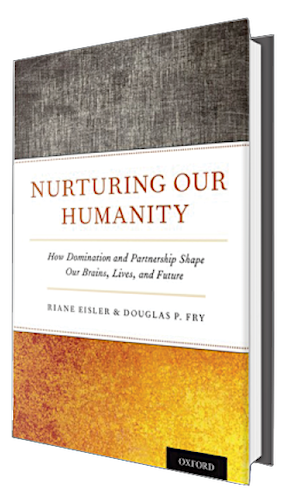In November 2018 the American Academy of Pediatrics released a policy statement warning that corporal punishment is linked to an increased risk of negative behavioral, cognitive, psychosocial, and emotional outcomes for children. They warned against spanking and any other form of physical punishment and verbal abuse of children. This is an important sign of movement towards Partnership.
Yet, Domination child rearing is still the norm in much of the world. As Eisler and others have documented, there is a global pandemic of violence against children as well as women. Old adages like "spare the rod, spoil the child" reflect the mindsets of many parents and many households still hold that the father is the "master of the house."

Child Abuse is an International Crisis
In domination-oriented cultures, physical and emotional abuse of women and children in households are "just the way things are." Violence and the threat of violence are strategies for control and keeping "natural" hierarchies intact. Family violence is also viewed as a private matter - not to be interfered with and unconnected to issues of public concern like politics and economics.
Domination values in families impact all of society?
When violence is the norm at home, children learn that it is normal and even moral to use violence to impose one's will on others. Psychology and neuroscience show that what children observe and/or experience in families affects their adult beliefs, behaviors, political attitudes, and the neural structures of their developing brains. Violence in families sets the stage for acceptance of domination-style power in the state and workplaces, in the form of bullying and "command and control" leadership.
Child abuse is of national and international importance. If we are serious about building a more peaceful world, stopping this "intimate violence" must be a top priority, not only for the sake of the millions directly affected, but for the sake of all of us. We cannot hope to sustain democracies in places where intimate violence and child-abuse are normalized. Efforts to end authoritarianism must include efforts to change the foundational relations within families to relations of mutual respect and non-violence.
The Center for Partnership Systems is committed to help stop violence against children worldwide.
Nurturing Our Humanity
 A healthy and nurturing childhood starts with partnership-oriented family relations. In Nurturing Our Humanity: How Domination and Partnership Shape Our Brains, Lives, and Future (Oxford University Press, 2019), by Riane Eisler and Douglas P. Fry, research in neuroscience shows that the human brain is flexible. Through the interaction between genes and our lived experience, behavior patterns become woven into our individual and social fabric over time.
A healthy and nurturing childhood starts with partnership-oriented family relations. In Nurturing Our Humanity: How Domination and Partnership Shape Our Brains, Lives, and Future (Oxford University Press, 2019), by Riane Eisler and Douglas P. Fry, research in neuroscience shows that the human brain is flexible. Through the interaction between genes and our lived experience, behavior patterns become woven into our individual and social fabric over time.
Relations in partnership-oriented societies are based on mutual respect, accountability, and caring. In many Nordic countries laws prohibit physical violence against children, and low poverty and crime rates and a generally high standard of living prevail. Indeed, what children experience and observe early on directly impacts how our brains develop, and how people feel, think, and act. The system we live in—whether it orients to Domination or Partnership—shapes politics, economics and other institutions, which in turn are inextricably interconnected with how we construct childhood and gender roles and relations.
Things to Do
Visit the Caring and Connected Parenting Program, and share the Caring & Connected Parenting Guide in English and Spanish:
Caring and Connected Parenting
Read Riane Eisler's article Protecting the Majority of Humanity: Toward an Integrated Approach to Crimes against Present and Future. Published in 2013, this chapter in a Cambridge University book introduces a new approach to protecting women and children. It shows that the human rights of present and future generations must include the private sphere of family and other intimate relations and proposes that international law, including the Crimes Against Humanity section of the Rome Statute be used to achieve this vital goal.
Read Riane Eisler's article Breaking the Devastating Link Between International Terrorism and Intimate Violence. Dr. Eisler addresses the connection between international terrorism and family violence and what we can all do to break cycles of violence in our lives and communities. Her research shows that throughout history, the most violently despotic and warlike societies have been those where violence, or the threat of violence, is used to maintain domination of parent over child and man over woman.
Patterns of a Domination System: the Real Impact of Intergenerational Trauma by Melanie Blow
A Win-Win Vision for Families by Dr. Louise Hart

